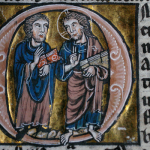Vatican City, Apr 15, 2015 / 03:13 pm (CNA/EWTN News).- Pope Francis has blessed the family of Asia Bibi, a Pakistani woman sentenced to death for blasphemy, as they continue to work for her release. Bibi’s husband, Ashiq Masih, said “the Holy Father blessed and encouraged us.” Masih and the couple’s youngest daughter, 14-year-old Isham, briefly met with Pope Francis after his Wednesday General Audience. “We are here in Italy to make sure we can be the voice of an innocent woman who has been suffering in jail for six years,” Masih told CNA April 15. Asia Bibi was convicted of violating Pakistan's strict blasphemy laws in 2010, an allegation she denies. She was accused of making derogatory comments against Islam’s Prophet Muhammad while arguing with a Muslim woman in 2009. On Oct. 16, 2014 the Lahore High Court rejected Bibi's appeal seeking to overturn the death sentence. Isham, Bibi’s daughter, was nine when her mother was arrested. She defended her mother during an April 14 press conference at Italy’s Chamber of Deputies. “The accusations against her are false,” Isham said. “My mother was working when two women asked her for water to drink. When my mother gave them the water, they began saying their hands were impure, that Christians are not dignified to eat and drink with Muslims, who are clean. On this basis, the accusation of blasphemy was built.” Masih told CNA he and his daughter wanted to ask Pope Francis to encourage the government of Pakistan to free Bibi. They also wanted to raise awareness about Bibi’s case before the Pope and European authorities. Joseph Nadeem, one of Asia Bibi’s lawyers, spoke about her case. “We still have the hope of a presidential pardon,” he told CNA, saying a pardon would immediately release Bibi. Appeals to the Pakistan Supreme Court “could take a very long time.” Bibi’s family is seeking help from the international community to pressure Pakistan’s government to help secure a presidential pardon. Masih visited his wife before the trip to Italy. She is currently an inmate in a prison close to Lahore. Bibi is kept in isolation because sharing a cell with Muslims could put her life at risk. “Since the day Asia Bibi was arrested, our family is totally destroyed. The children cannot survive without their mother. Asia Bibi misses her children, the children miss her,” said Masih. “Asia’s faith is very strong, but she cries,” Masih added. “All of our family is praying to God to help her, and so we appeal to international community.” “The life of Christians in Pakistan is very difficult,” he said, adding that “every Christian is in danger in Pakistan.” People in Pakistan have made public protests against Bibi’s release. Some of those released from prison after facing blasphemy charges have been killed. According to Masih, their killers “enjoy great esteem.” He said that about 74 percent of Pakistan’s population is Muslim, adding “most of them are against Asia Bibi, they don’t want her to be set free. “If Asia Bibi will be free, she cannot stay in Pakistan, she should move abroad very quickly.” The blasphemy law has been in effect since 1986. According to the Pakistan Catholic Church’s National Committee for Justice and Peace, at least 964 people have been charged with the crime of blasphemy from 1986 to 2009. Among these were 479 Muslims, 340 Ahmadis, 119 Christians, 14 Hindus and 10 people whose faith is not known. Asia Bibi is the first woman sentenced to death under the 1986 law. The law has faced criticism within Pakistan, as well. Salman Taseer, a Muslim who was governor of Punjab, called the law a “kala kanoon,” a “black law” in the Urdu language, because it can be exploited. Shabhaz Bhatti, a Catholic who had served as Pakistan’s minister for religious minorities, said that the law is often used “as a tool to solve personal issues” and that 85 percent of the charges are false. Both Taseer and Bhatti advocated for Asia Bibi’s release. Both of them were assassinated in 2011 by Islamist extremists. Religious extremism in Pakistan is still a major issue. Fides news agency reported that a 14-year-old boy named Nauman Masih was recently burned alive by a group of Muslims, causing severe burns. After several days at a Lahore hospital, he died April 15. The boy had reportedly been assaulted because he had said he was Christian. Read more
















